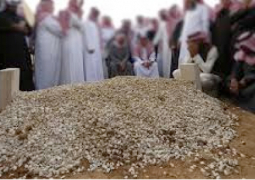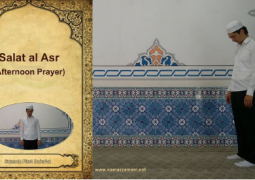
These are forbidden as they are vestiges of the Days of Ignorance. Ibn Al-Munzhir said: “This practice is disliked by all men of knowledge and scholars on record. Al-Baihaqi said: ‘Aishah, ‘Ubadah ibn Al-Samit, Abu Hurairah, Abu Sa’id Al-Khudri, and Asma, the daughter of Abu Bakr, all stated in their respective wills that their funeral processions should not include anyone carrying fire (or torches). According to Ibn Majah, Abu Musa Al-Ash’ari, on his deathbed, directed his heirs, saying: “Do not follow my funeral procession carrying any censers (with fires in them to burn frankincense for its aromatic smoke and fragrance).” The people asked him: “Did you hear anything from the Prophet concerning this?” He said: “Yes, I heard the Prophet, peace be upon him, saying so. (Among the narrators of this hadith is a man called Abu Huraiz, the freed slave of Mu’awiyah, who is “unknown” amongst the narrators of hadith) If the burial takes place at night, however, fire or torches may be used for light. Tirmizhi has reported on the authority of Ibn Abbas that once at night the Prophet, peace be upon him, entered a grave to bury a dead person, and a lantern was given to him and he took it.” Tirmizhi said: This hadith from Ibn ‘Abbas is sound.
Sitting down, when one is following a funeral, before those carrying the coffin put it down
Bukhari said: “A person accompanying a funeral procession should not sit down until the coffin is placed on the ground, and if he sits he should be asked to stand up.” He reports from Abu Sa’id Al-Khudri that the Prophet, peace be upon him, said: “Stand up when you see a funeral procession, and he who accompanies it should not sit down until the coffin is placed on the ground.” Bukhari also reports from Sa’id Al-Maqabari who narrated that his father said: “We were attending a funeral, and Abu Hurairah was holding Marwan’s hand, and they both sat down before the coffin was placed on the ground. At this Abu Sa’id approached them, and taking Marwan by his hand said to him: ‘Stand up! By Allah, this man (i.e., Abu Hurairah) knows that the Prophet, peace be upon him, has forbidden us (to sit).’ Upon hearing this Abu Hurairah said: ‘He is right.’’ This has also been reported by Al-Hakim, with the following addition: “When Abu Sa’id told Marwan to stand up, he stood up and then asked him: ‘Why have you made me stand up?’ At this Abu Sa’ id related this hadith to him. Then Marwan asked Abu Hurairah why he had not informed him about that hadith. Abu Hurairah replied: ‘You were walking ahead of me, so when you sat down I too sat down.” Most of the Companions, their successors, the Hanafi and Hanbali schools, Al-Awza’i and Ishaq hold this view. The followers of Ash-Shafi’i, however, hold that a person walking in front of a funeral procession may sit down before the coffin is placed on the ground. There is agreement among scholars that for those walking ahead of the funeral precession there is no harm if they arrive early at the place of burial and sit down before its arrival. Tirmizhi said: “It is related from some knowledgeable Companions of the Prophet, peace be upon him, and others that they would walk ahead of a funeral procession, and would sit down if they reached the place of burial before the coffin. This is the opinion of Ash-Shafi’i, who holds that, if a funeral arrives while one is seated, one need not stand upon its arrival. Ahmad said: “There is no harm whether one stands up or remains seated upon its arrival.”
Remain Seated When a Funeral Procession Passes by
Ahmad has reported that Waqid ibn ‘Amr ibn Sa’d ibn Mu’azh said: -I attended a funeral procession in the tribe of Banu Salimah. I stood up on seeing the funeral procession. Thereupon Naf’i ibn Jubair said to me: ‘Sit down. I will give you the reason for this. Mas’ud ibn Al-Hakim Az-Zurrqi told me that he heard ‘Ali ibn Abi Talib saying: -The Prophet, peace be upon him, commanded us to stand up upon seeing a funeral procession, but later on he would remain seated, and bade us to do the same.’ ‘- Muslim has reported it in these words: “We saw the Prophet, peace be upon him, standing, so we stood. Then he sat down, and we too sat. Tirmizhi said: ‘This hadith from ‘Ali is sound, and it includes four of the successors of the Companions who related it successively. According to some people of knowledge this is the common practice.’’ Ash-Shafi’i said: -This is the most authentic report on the subject. This hadith abrogates the one cited previously which says: ‘Stand up when you see a funeral procession.’ - Ahmad said: -One may or may not stand up for a funeral procession, depending on one’s preference. He argues that the Prophet, peace be upon him, used to stand up for a funeral, but later on he would remain seated.’ This is also the opinion of Ishaq ibn Ibrahim. Ahmad, Ishaq ibn Hubaib, and Ibn Al-Majishun of the Maliki School. An-Nawawi said: “Considering all these opinions, standing up upon seeing a funeral procession is desirable.” Al-Mutawalli and Ahmad also hold this view. Ibn Hazm said: “Standing up upon seeing a funeral procession is recommended, even if it is a funeral of a disbeliever or a pagan, until the coffin is placed on the ground or disappears from sight. But if someone remains seated there is no harm. Those who hold it as a desirable act cite what is related by the group on the authority of Ibn ‘Umar who reported from ‘Amir ibn Rabi’ah that the Prophet, peace be upon him, said: “When you see a funeral procession stand up for it, and remain standing until it disappears from sight or (the coffin) is placed down on the ground.” Ahmad said: “Whenever Ibn ‘Umar saw a funeral procession he would stand up for it and would remain standing until it passed by.” Sahl ibn Hanif and Qais ibn Sa’d reported that they were sitting in Qadisiyyah (A town in Syria) and a funeral procession passed by them. On seeing it both of them stood up for it. They were told it was the funeral of a non-Muslim. They said: -Once when a funeral procession was passing by, the Prophet, peace be upon him, stood up for it. And when told that it was funeral procession of a Jew, he exclaimed: ‘Does he (a Jew) not possess a soul?’’ (Bukhari and Muslim) Ibn Mas’ud and Qais used to stand up for a funeral procession. The wisdom behind standing, according to Ahmad, Ibn Hibban and Al-Hakim, as stated in a hadith related from the Prophet, peace be upon him, is “to show respect to Him Who seizes the souls” or in the words of Ibn Hibban “as a mark of respect to Allah Who seizes the souls.” In short, there is disagreement on this issue among the scholars. Some disapprove of standing for a funeral procession, while others prefer it. Some leave it to the individual’s discretion. Each of these scholars supports his stand with specific arguments, and one may follow any of these opinions.
TO BE CONTINUED
Read Other Articles In Muslims Hands




